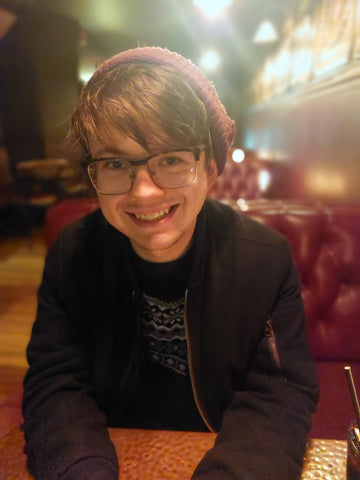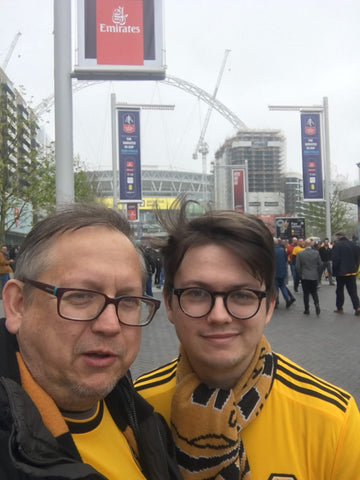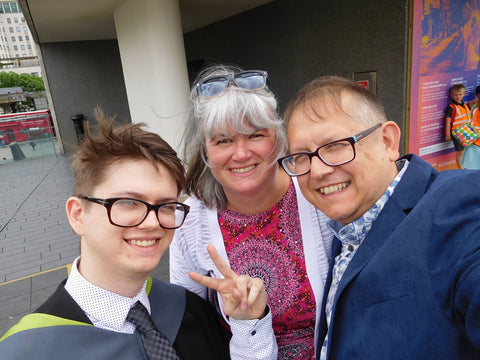Oliver from Worcestershire died in January 2022, just 20 days after he was diagnosed with a glioblastoma (GBM). It’s after the 26-year-old had a series of symptoms in quick succession including headaches, blurred vision, sickness and speaking nonsense. Having lost their only child, bereaved parents, Robin and Wendy are campaigning for more investment into research for brain tumours to help future generations diagnosed with the devastating disease.

Here is Oliver’s story, as told by his dad, Robin…
Oli was an intelligent lad and loved watching football, we both did, Wolverhampton Wanderers was our thing. He was working as a dental technician alongside co-founding a computer games company. He was fit and healthy, never sickly, I can’t even remember the last time he would have gone to the doctors before he died. I had heard of brain tumours before Oli was diagnosed but that was it, I had no idea of the vast list of symptoms that can vary from patient to patient.

During summer 2021, Oli returned home from the University for the Creative Arts in Farnham where he achieved a first in Computer Games Art.
He decided to learn how to drive. He’d worn glasses since junior school and as he was behind the wheel he noticed his vision was blurry with his glasses. He had an eye test and there was a change in his prescription.
The optician commented that vision in Oli’s left eye had changed quite a lot and his glasses were updated. Around November, Oli complained of a headache which was unusual for him – he’d normally work through any kind of ailment.
As Christmas approached, his headaches became more frequent. We thought it could be associated with his vision and getting used to new glasses.
We enjoyed Christmas and new year together. Oli was a sociable character and saw his friends and spent time with his girlfriend Abi.

In January, we were due to watch Wolves play Sheffield United. I gave Oli a kiss and hugged him on Friday as he went off to spend the first part of the weekend at Abi’s house, expecting to be reunited for the football game that Sunday.
Around 10am on the Saturday, Abi’s car turned up and she dropped Oli back home a day early. He told us he hadn’t been feeling very well and had thrown up overnight and that during dinner, he had apparently been talking nonsense.
Within five minutes of arriving home, Oli threw up. It happened again half-an-hour later and Oli became confused and wasn’t making sense.
“Alarmed, we called 999 for an ambulance. He lost all coordination and within 20 minutes didn’t know who we were. He was taken to hospital.”
Wendy and I had to sit at home due to some COVID-19 restrictions still in place. We got a call from Worcester Hospital asking us to get to the stroke ward as soon as possible. When we arrived Oli wasn’t there, instead we were taken to a side room and shown the image from a CT scan revealing a lump the size of a walnut on Oli’s brainstem.
At first we didn’t really take it in. The doctor said it was serious and Oli was taken to Coventry Hospital which was 50 miles from where we lived.
He was taken to the operating theatre where he had a drain fitted. The procedure was touch and go and after he was transferred to critical care. About a week later, when Oli was finally stable enough, he had an MRI scan which confirmed that the tumour was a glioblastoma (GBM). Not only was Oli’s tumour high-grade, it was very aggressive and had grown dramatically in the short time he had been in hospital.
Oli was placed on a ventilator and mostly remained in a coma-like state from when he went into hospital. We had a glimmer of hope when he squeezed our hand. However, conversations once hopeful, were now stunted by the medical team who were reluctant to move forward with any treatment plan due to fragility of Oli’s condition.

The tumour was inoperable and chemotherapy wouldn’t benefit him. We were told if he had a tracheostomy, he may have a couple of weeks. The tumour had destroyed the cells that controlled Oli's breathing, meaning he couldn’t breathe independently. We didn’t want him to have to go through anything so traumatic for such little gain.
The rate his tumour had grown in hospital meant we were dealing with days. As we walked through the corridor to be with Oli one last time there was a ripple of applause. It came from those caring for him because he was a organ donor, and he would now help others to live.
Oli died in hospital on 28 January 2022.
For us, everything happened so lightning quick, Oli was taken away in an ambulance and we never got to speak again. We never got our battle, which you read so much about with other families trying to do what they can to save their children and loved ones. In a way, I’m glad that Oli didn’t have to suffer for months or even years even though it hurts so much to be without him.
That’s why we have signed the petition to increase research funding.
What sticks with me is that brain tumours kill more children and young people under the age of 40 than any other cancer but where is the investment to save this generation of brain tumour patients?
It’s too late for Oliver but if our experience can help raise awareness and get the Government to sit up and listen then that will be our battle for Oli.
Robin Amess
September 2023
Brain tumours are indiscriminate; they can affect anyone at any age. What’s more, they kill more children and adults under the age of 40 than any other cancer... yet just 1% of the national spend on cancer research has been allocated to this devastating disease since records began in 2002.
Brain Tumour Research is determined to change this.
If you have been touched by Oliver’s story, you may like to make a donation via www.braintumourresearch.org/donate or leave a gift in your will via www.braintumourresearch.org/legacy
Together we will find a cure

